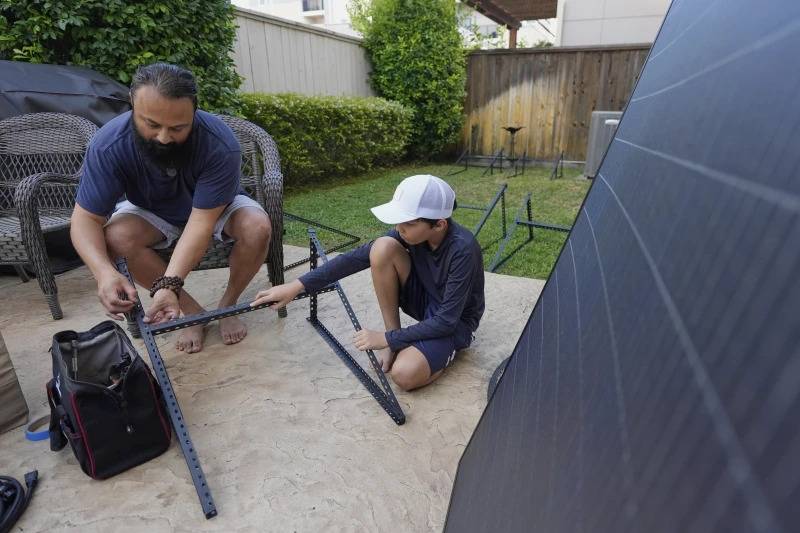US consumers hot for plug-in solar panels

A knock on his door and a flyer convinced Terrence Dwyer of Oakland, California, to buy a solar panel system small enough to fit on his deck.
Solar systems that plug into regular wall outlets have been popular in Europe for years, and are now gaining traction in the United States for their affordability and simple installation.
“We thought absolutely, let’s do this right away,” Dwyer said.
These small-scale solar systems—also called plug-in or balcony solar—could become attractive to more homeowners now that President Donald Trump’s sweeping budget bill is due to scrap solar tax credits.
Even before the bill passed, plug-in solar manufacturers were already seeing increased demand.
There were other positive signs, such as a new Utah law streamlining regulations for homeowners buying plug-in solar.
Lower electric bill
The $2,000 solar system installed on Dwyer’s backyard deck in March consists of two 400-watt panels, an inverter, a smart meter and a circuit breaker.
He said this saves him around $35 per month on his electricity bill because he is consuming less energy from the grid.
But reducing carbon footprint was his primary motivation, Dwyer said. “We like the environmental benefits of solar and wanted to engage with solar in some fashion.”
Had he opted for rooftop solar, he would have paid $20,000 for the system and $30,000 to upgrade his roof to support the panels.
‘Not complicated’
Installing a plug-in solar system, however, requires some homework.
Regulations vary as to what power companies allow customers to do with energy-generating equipment. This is why prospective purchasers should first check their utility’s policies.
Building permits might also be required, depending on your municipality. And some systems can be self-installed while others may require an electrician.
Some kits, for example, have meters that must be wired into a home’s circuit breaker.
But Baltimore resident Craig Keenan, a mechanical engineer, said it took him only 10 to 15 minutes to set up his plug-in solar.
“I think anyone can install this,” he said. “It’s not complicated. It doesn’t require a technical degree.”
Saving money was one reason why he installed one of the smaller models on his balcony, Keenan said.
Sold-out models
Dwyer bought his system from California nonprofit Bright Saver, which also offered recently a smaller model at $399 that sold out in less than a week.
“The interest and demand have been overwhelming,” said Cora Stryker, a founder of Bright Saver. “It is clear that we are hitting a nerve—many Americans wanted solar for a long time but have not had an option that is feasible and affordable for them until now.”
Other companies selling plug-in solar kits include Texas-based Craftstrom—which has sold about 2,000 plug-in systems since 2021, mostly in California, Texas and Florida.
Resistance from utilities
But Kevin Chou, another founder of Bright Saver, noted that wider adoption of the systems in the US has also been hindered by utility policies which create uncertainty about whether they’re allowed—and by a lack of state and local regulations making clear which rules should apply.
According to some utilities contacted by The Associated Press, plug-in solar requires the same interconnection applications as rooftop panels that send electricity back to the wider network.
But Steven Hegedus, an electrical engineering professor at University of Delaware, said he doesn’t understand why a utility company would require an interconnection agreement for plug-in solar—which, unlike rooftop systems, are designed to prevent energy from flowing to the grid.
Supportive legislation
Opposition from utilities was expected since customers were buying less energy. But this year, Utah enacted a novel law supporting plug-in solar—by exempting certain small-scale systems from interconnection agreements and requiring certifications on safety by a recognized testing organization like Underwriters Laboratories.
Bright Saver said it is lobbying other states for similar legislation, while companies like China-based EcoFlow, which sell across the world’s regions, plan to offer plug-in solar in Utah and other states if supportive legislation is passed.

















